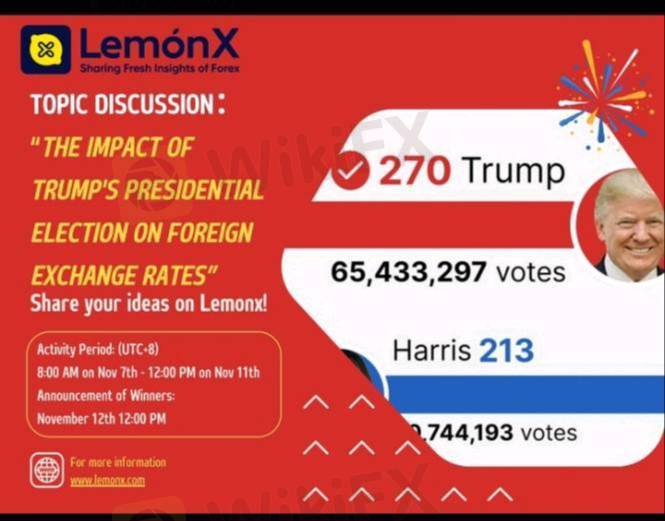
2024-11-07 22:04
업계에서impact of Trump election on stock Trading
The election of Donald Trump as President of the United States in November 2016 had a significant impact on stock trading and financial markets, both in the immediate aftermath and over his presidency. Here are some key points regarding that impact:
### Immediate Reaction to the Election
1. **Post-Election Rally**: Upon Trump's election, markets experienced an immediate rally. The Dow Jones Industrial Average jumped around 1,000 points in the days following the election, driven by investor optimism about pro-business policies, tax cuts, and deregulation that the Trump administration was expected to implement.
2. **Sector-specific Gains**: Certain sectors benefited more than others. For example, financial stocks surged on expectations of deregulation, while industrial and energy stocks also saw gains due to Trump's focus on infrastructure spending and fossil fuels.
3. **Volatility**: Despite the initial rally, the election outcome contributed to heightened market volatility, as investors reacted to the uncertainty surrounding Trump's policies, trade relations, and overall governance style.
### Key Policies and Their Market Impact
1. **Tax Cuts and Jobs Act**: In December 2017, Trump signed a major tax reform bill that lowered corporate tax rates. This led to increased corporate profits, which in turn contributed to stock market gains, particularly for large-cap corporations.
2. **Deregulation**: The Trump administration rolled back numerous regulations across industries, including finance and environmental sectors, which was generally viewed positively by the markets, particularly by businesses that faced the burdens of compliance.
3. **Trade Policies**: Trump's trade policies, including tariffs on China, created uncertainty and volatility. While some sectors, like steel and aluminum, benefited from protectionist measures, others, particularly those reliant on global supply chains, faced challenges. The markets frequently reacted to news related to trade negotiations.
4. **Monetary Policy Relations**: The relationship between the Trump administration and the Federal Reserve also influenced stock trading. Trump's critiques of Federal Reserve interest rate hikes led to expectations about future monetary policy adjustments, affecting market sentiment.
### Overall Performance During Presidency
1. **Bull Market**: The stock market experienced substantial gains during most of Trump's presidency, with the S&P 500 significantly increasing. However, these gains were punctuated by
좋아요 0
Daddy girl
Trader
인기있는 콘텐츠
시장 분석
투자주체별매매 동향
시장 분석
유로존 경제 쇠퇴 위기 직면
시장 분석
국제 유가는 어디로
시장 분석
미국증시 레버리지(Leverage)·인버스(Inverse)형의 ETF, 최근 사상 최대 신
시장 분석
투기장 된 원유 ETL...첫 투자위험 발령
시장 분석
RBNZ 양적완화 확대
포럼 카테고리

플랫폼

전시회

대리상

신병 모집

EA

업계에서

시장

인덱스
impact of Trump election on stock Trading
 나이지리아 | 2024-11-07 22:04
나이지리아 | 2024-11-07 22:04The election of Donald Trump as President of the United States in November 2016 had a significant impact on stock trading and financial markets, both in the immediate aftermath and over his presidency. Here are some key points regarding that impact:
### Immediate Reaction to the Election
1. **Post-Election Rally**: Upon Trump's election, markets experienced an immediate rally. The Dow Jones Industrial Average jumped around 1,000 points in the days following the election, driven by investor optimism about pro-business policies, tax cuts, and deregulation that the Trump administration was expected to implement.
2. **Sector-specific Gains**: Certain sectors benefited more than others. For example, financial stocks surged on expectations of deregulation, while industrial and energy stocks also saw gains due to Trump's focus on infrastructure spending and fossil fuels.
3. **Volatility**: Despite the initial rally, the election outcome contributed to heightened market volatility, as investors reacted to the uncertainty surrounding Trump's policies, trade relations, and overall governance style.
### Key Policies and Their Market Impact
1. **Tax Cuts and Jobs Act**: In December 2017, Trump signed a major tax reform bill that lowered corporate tax rates. This led to increased corporate profits, which in turn contributed to stock market gains, particularly for large-cap corporations.
2. **Deregulation**: The Trump administration rolled back numerous regulations across industries, including finance and environmental sectors, which was generally viewed positively by the markets, particularly by businesses that faced the burdens of compliance.
3. **Trade Policies**: Trump's trade policies, including tariffs on China, created uncertainty and volatility. While some sectors, like steel and aluminum, benefited from protectionist measures, others, particularly those reliant on global supply chains, faced challenges. The markets frequently reacted to news related to trade negotiations.
4. **Monetary Policy Relations**: The relationship between the Trump administration and the Federal Reserve also influenced stock trading. Trump's critiques of Federal Reserve interest rate hikes led to expectations about future monetary policy adjustments, affecting market sentiment.
### Overall Performance During Presidency
1. **Bull Market**: The stock market experienced substantial gains during most of Trump's presidency, with the S&P 500 significantly increasing. However, these gains were punctuated by
좋아요 0
나 도 댓 글 달 래.
제출
0코멘트

댓글이 아직 없습니다. 첫 번째를 만드십시오.

제출
댓글이 아직 없습니다. 첫 번째를 만드십시오.